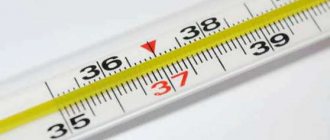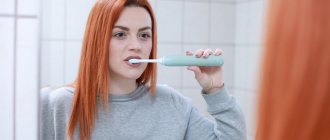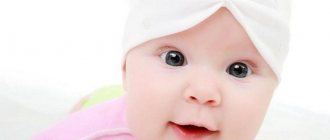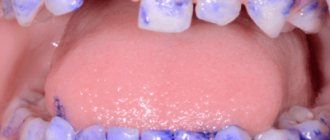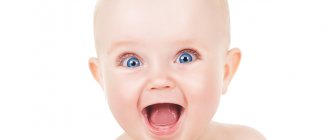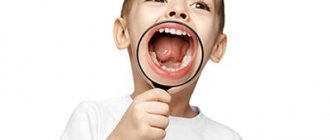Sometimes you are surprised to notice that parents strive to “decorate” their babies in a way that is clearly inappropriate for their age: for example, earrings on one-year-old princesses are no longer uncommon. Or why does a child need amber beads if this decoration on a child’s neck looks clearly alien?
Rumors persistently circulate among parents that amber can relieve pain during teething, and pediatricians and dentists refute this claim with no less enthusiasm. Where can we find the truth?
Amber beads for teething in children: benefits and harms
Let's find out whether amber beads help with teething in children. Let's start with the fact that amber actually has a number of unique healing properties that are not inherent in other substances of natural and artificial origin (we'll talk about this below). This explains the widespread popularity of amber beads for children.
Silver necklace with amber (go to the SUNLIGHT catalog)
According to parents and supporters of alternative medicine, amber beads:
- They have adaptogenic properties. The baby adapts to changes more easily, becomes calmer, and sleep improves. This contributes to the proper development of the child and peace of mind for parents.
- They have an anti-inflammatory effect. Amber is a natural antiseptic; it prevents the occurrence of inflammatory processes and promotes the speedy healing of wounds.
- Affect acupuncture zones. Amber beads for children are made in such a way that they lie around the neck and act on acupuncture points like miniature massage applicators.
- Prevents a number of diseases. According to parents, when children constantly wear amber beads, they are less likely to suffer from infectious diseases. Beneficial microelements penetrate the skin in close proximity to the thyroid gland, which contributes to the proper growth and development of the child. The immune system is strengthened, and this is also worth a lot.
- Mechanically facilitate the process of teething. The baby gnaws on the beads, and teething is more gentle thanks to the antiseptic and analgesic properties of amber. Teeth grow stronger and healthier.
Serious researchers do not find confirmation of the above facts. According to official medicine, amber beads do not have a pronounced therapeutic effect.
According to pediatricians, parents who put amber beads on their little children risk the health of their children. For example, beads can cause asphyxia: direct suffocation with a thread or ingestion of scattered beads. In addition, unprocessed amber can damage children’s delicate gums during active jaw movements.
However, all risks are minimized with the correct selection of amber beads for very young children.
Is it safe to wear beads in case they fall off?
“What if my child picks off the beads and doesn’t want to wear them?” - you ask.
In our practice, this happens extremely rarely! It is important to understand that the child does this not because something is bothering him, but because he felt some kind of invasion of his personal space. Or, as an option, the mother chose the wrong moment to put on the beads - when the baby was passionate about something or was out of sorts. Perhaps the attempt to pick the beads is a mini-protest, an attempt to attract attention at a level accessible to the child. Therefore, little tricks:
Put the beads on your child shortly before waking up. They are practically weightless, and within a minute they will take on body temperature, which means they will become imperceptible on the skin. When the baby wakes up, he won’t even feel that an amber thread has appeared on his neck.
The second important nuance: do not focus your attention on the beads and ask your friends and family not to do this either, at least for some time. Shouts like: “Who has these beads!” Oh, what a beauty! rather, they will force the child to feel his neck and discover something new and interesting there to study. But amber beads are not bought for decoration; mothers buy them for a specific medicinal purpose. Grace and style are secondary qualities, so to speak.
Everything written above applies more to children aged about a year and older. It is more convenient for babies under 6 months to put on beads when they lie on their tummy: this way the neck straightens out from the folds, and the mother sees that the thread is not short.
Useful properties of amber
The benefits of amber beads for children are based on the healing properties of the main material for their manufacture. Amber is a unique natural formation from the resin of plants that grew on Earth many millions of years ago. Over such a long period of time, fossil resin acquires the hardness of stone and unique properties (including healing ones).
The main active substance in this case is succinic acid. It is widely used in cosmetology, being part of many skin care products. It is also widely used in medicine, being part of dietary supplements that have a beneficial effect on blood composition and the state of the immune system.
Succinic acid can also help dads who are too diligent in noticing the appearance of their offspring’s first teeth. This is the first and absolutely harmless remedy for sobering up and relieving withdrawal symptoms.
Amber beads for babies help saturate the body with this very useful substance. It gradually penetrates the body, exerting a gentle effect on all organs and systems of the developing organism.
Caring for baby teeth
You need to take care of your teeth immediately after teething. Moms do it first. For adults, special finger brushes have been created that are convenient for cleaning teeth from plaque, but so far without toothpaste. When the baby learns to rinse his mouth and spit, they move on to brushing with children's toothpaste without fluoride (this can be done earlier if the tube indicates that the toothpaste is from 0 years). So, gradually, the child will form a useful habit of caring for the oral cavity.
Another important reason for caring for teeth from infancy is that it affects the formation of permanent teeth and bite. For example, caries of a temporary tooth can transfer to the germ of a permanent one. And early loss (before 5 years) of a baby tooth will lead to uneven dentition in the future. If the molar does not begin to grow in time, the adjacent baby teeth will move and fill the resulting space.
How to choose the right amber beads for your baby
Most accidents involving children's amber beads are due to improper selection. The biggest mistake parents make is making this useful decoration themselves or using accessories intended for adults.
When choosing amber beads for a child, it is wise to pay attention to the following points:
- Amber processing. The beads should be large enough and very smoothly polished so as not to damage the delicate baby skin.
- Accessory length. The beads should fit tightly to the skin, but not “strangle” the little one. This ensures the maximum therapeutic effect and minimizes risks - the child cannot independently reach the decoration with his mouth.
- A thread. The best option is a thick silk (sometimes nylon) thread. The presence of knots separating the beads from each other is welcome. Even if the beads break (which is unlikely), at most one bead will come off the thread. The decorations on the fishing line are far from ideal: theoretically, it can damage the baby’s delicate tissues.
- Clasp. There are two best options: a clasp made of soft plastic and amber itself. In all cases, a screw-on clasp is welcome, which when fastened is completely hidden inside the amber. No metal or other risky materials!
- Availability of a certificate. Unfortunately, there are many fakes in this area. For example, cured epoxy resin looks very much like amber to the uneducated eye. You always have the right to request a certificate, because we are talking about the health of your baby.
Natural amber is widely used in lithotherapy. For example, many medicus of the past considered rubbing amber plates on the temporal areas to be the best remedy for migraines.
Teething order
At the time of birth, the baby has no teeth, but there are exceptions to this rule. Often, the order of growth of baby teeth is as follows:
- Teething begins at the age of 6-8 months. The first to appear are the central incisors of the lower and then the upper jaws. This is the very moment when you should worry about choosing the first toothbrush for your offspring.
- Between 8 and 12 months, the lateral incisors are added.
- At 10-16 the fangs take their place.
- At one and a half years, the back teeth (or molars) usually erupt completely.
The primary dentition completes its formation by the age of three, when the second back teeth begin to grow.
Carefully monitor the teething process until it is completed, since during this period the first pathologies may appear, such as childhood bruxism (teeth grinding). At the slightest suspicion, consult an orthodontist.
Rules of use and precautions
Some sources recommend giving children large pieces of raw amber to chew on. Under no circumstances should you do this. Firstly, you are unlikely to find a piece of fossil resin of a sufficiently safe size, and secondly, the edges of unprocessed amber are unsafe for a baby’s gums and skin.
View all jewelry from the AMBER collection in the SUNLIGHT catalog
You can periodically remove the beads from the baby and let him play with them: the little one will certainly like the bright toy. It is also not forbidden to chew the beads. However, this must be done under the constant supervision of parents, and at night it is better to remove the beads and hide them in order to avoid any accidents.
Paired jewelry collection “Mama’s Daughter”
Undoubtedly, every baby wants to be like her mother. How many times do mothers hear from their daughters “Mom, your beads are so beautiful, let them wear them” or “Buy me earrings like yours!”... how difficult it is to refuse such a sweet request!
For a baby, a mother is a kind of style icon. After all, only between a mother and her daughter there is an invisible, but the strongest family connection. A mother shares her deepest secrets with her baby and is an ideal in matters of raising and shaping the style of a future fashionista. And this applies not only to makeup, shoes and outfits. With what pleasure the little ones look at the jewelry from their mother’s box! Read more...
How to care for amber
Amber is a very delicate substance that requires careful care. It should be stored at room temperature, and when cleaning it, refrain from using abrasives and aggressive reagents.
If we are talking about children's jewelry, then it should be stored in a personal box on a soft cloth. To clean, it is enough to periodically rinse the beads with warm water. In case of heavy contamination, it is permissible to use a soap solution, but after this the beads must be thoroughly rinsed and dried with a napkin.
Whether to buy amber beads for a child is a personal matter for his parents. If you believe in the healing power of stones, buy with confidence: if properly selected and used wisely, this jewelry will definitely not harm your baby!
09.04.21
Unusual stone
In relation to amber, one can constantly use the epithet “unique”. What is its unusualness and how does it differ from other stones?
- It sounds paradoxical, but it is a soft stone;
- it is of organic origin;
- does not form crystals;
- burns and forms vapors at a temperature of 350 degrees, and if the temperature increases to 1000 degrees, it completely evaporates;
- becomes soft in boiling water;
- becomes electrified by friction;
- does not sink in the sea because it has the same density as sea water;
- luminesces under the influence of ultraviolet light.
Application of amber beads
To comply with safety rules, you must adhere to the following recommendations:
- do not leave the child alone with beads around his neck; an adult should be near him;
- the length of the product is selected so that the baby cannot put small parts into his mouth;
- It is strictly forbidden to chew beads, since amber is quite soft and can crack;
- Be sure to remove jewelry at night;
- Every time before putting it on, you need to carefully inspect it for cracks, chips and other damage, and also monitor the integrity of the thread.
If your baby sleeps much better with beads when his teeth cause pain and anxiety, then change the jewelry to his ankle during sleep and only during the day let the child wear it around his neck under the close attention of adults.
